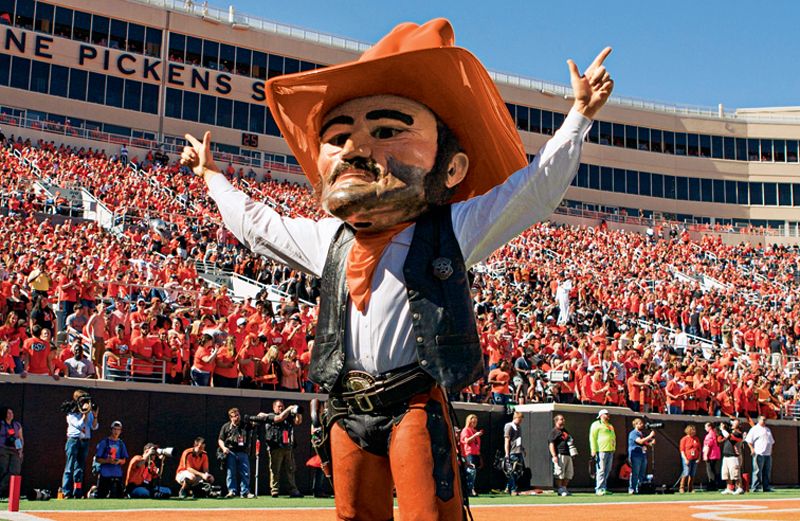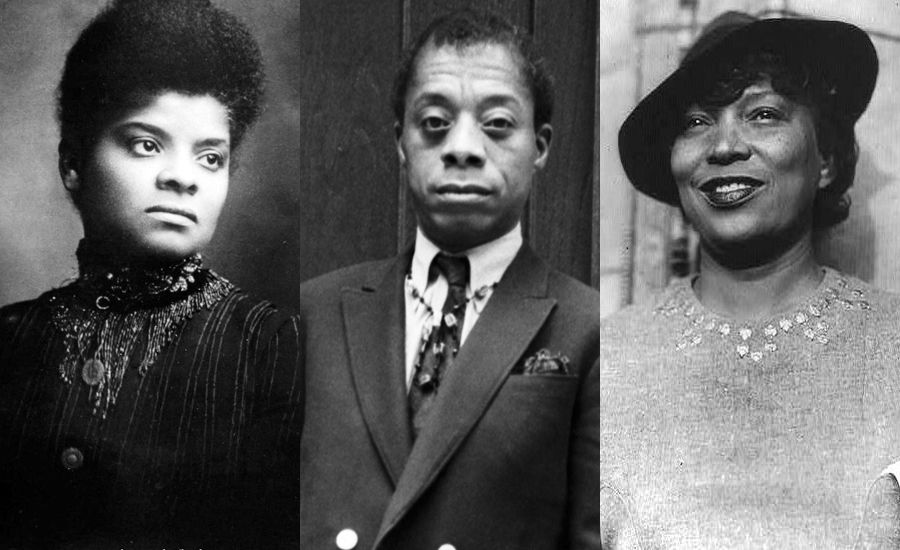It was just a meeting room at Oklahoma State University’s historic basketball arena. But walking in there that day in the spring of 2002, I knew how lawyers must feel stepping before the Supreme Court.
I faced the panel of judges seated behind a horseshoe-shaped table. Six men who held my fate in their hands. They had all served as the OSU Cowboys’ famed mascot, Pistol Pete. Would it finally be my turn?
These same judges had rejected me before. Twice. Now I was a fifth-year senior. This was my last chance.
“Tell us, Jason,” one judge said. “Why do you want to be Pistol Pete?”
My dream went back to one magical day when I was eight. My dad was a sociology professor at OSU, and I grew up in Stillwater, not far from campus. Our family was big into Cowboy football, and that summer my brother and I went to Fan Appreciation Day.
We lined up to get autographs from the team. My brother held running back Barry Sanders’s autograph aloft like it was the Heisman Trophy. Me, I was awestruck too…by Pistol Pete.
The players were big, strong guys, but this cowboy? He was larger than life. He could get everyone in the entire stadium on their feet shouting “Go Pokes!” and make sure they had fun.
When he signed his name for me, with bullets for the Ps, I just knew I wanted to be Pistol Pete someday. It was like a saying I’d heard once: Sometimes you get such a strong feeling, you know it has to come from God.
Being the mascot fit my personality. I was the youngest of four kids and loved getting attention—and a laugh. I didn’t have the arm or the speed to play football at Stillwater High. But no one could top me when it came to school spirit.
Friday nights I showed up at games with my face painted the school colors and raced through the bleachers, getting the crowd pumped up.
Only seniors could be voted the mascot, and I was a shoo-in my last year at Stillwater High. Not to brag, but I was good. I entered a national high school mascot competition and finished twelfth. There was no question where I was going to college and what I’d do once I got there.
When tryouts for Pistol Pete were announced my sophomore year at OSU, I talked to Curtis, an old youth-group sponsor, after church. He’d been a cheerleader and was now a spirit-squad coordinator at the school.
He filled me in on the tryout process and told me, “You’d make an awesome Pistol Pete.”
Exactly. I worked hard at the mascot training clinics. I mastered the bowlegged cowboy strut. I perfected signing Pistol Pete’s autograph (I had an edge since I’d had years to study the one I’d gotten as a kid).
I learned how to balance the 45-pound head on my shoulders and pantomime emotions from excitement to hope to determination to pride, anything that might arise in a game situation. I nailed it all at tryouts.
Then came the interview with the six judges. The main question was, “Why do you want to be Pistol Pete?”
I’d rehearsed my response until even my girlfriend, Tiffany, my biggest supporter, was tired of hearing it. \“Because I’ve been training for this all my life,” I told the judges.
I ticked off my credentials: hometown boy, my experience as the Stillwater High mascot, my showing in the national competition. If I sounded cocky, well, wasn’t Pistol Pete supposed to show some cowboy swagger?
The judges gathered the candidates to announce their decision. They’d selected two students to be Pistol Pete since there were so many performances— not just at games and matches but at pep rallies, business openings and other events. The first name called wasn’t mine.
They’re saving the best for last, I thought.
One of the judges declared, “Our second Pistol Pete for the 2000-2001 school year is…” I could only watch, crushed, as another student leaped into the air and shouted, “Yes!”
What did I do wrong? I asked Curtis for the lowdown.
“The panel really liked you,” he said. “It’s just that one of the younger Pistol Petes missed a couple of engagements, and they wanted older, more mature students this time. Don’t worry. When the judges like someone and don’t choose him the first time, they usually pick him the next year.”
I shook off my disappointment and renewed my focus on becoming Pistol Pete. Tiffany was behind me 100 percent. I talked up my dream to my coworkers at my part-time job in the audiovisual department, and they were rooting for me too.
When tryouts came the following spring, I was more than ready. I put on the head and breezed through every situation that was thrown at me. Then I strode before the judges again for the interview.
“You know me from last year,” I said. “You know how badly I want this. And you know how good I’d be.” I thought it was a done deal, that I’d spend senior year being Pistol Pete, living my dream.
The judges thought otherwise. They didn’t call my name. This was supposed to be my turn, God! I left feeling cheated and defeated, lower than I’d ever felt in my life. I drowned my sorrows with my roommates and, I have to admit, more than a few bottles of beer.
The next day I walked into the audiovisual department to find my coworkers waiting for me under a huge sign made out of butcher paper. Congratulations, Pistol Pete! it read in big orange-and-black letters, the OSU colors.
I couldn’t find the words to tell them. I just shook my head, took the sign down and threw it away.
I threw away a lot more than that over the next months. I’d switched my major from business to math, my best subject. But now I lost interest and it showed in my grades. I talked to my academic advisor. “I’m not cut out to be a math teacher,” I said. “What if I change my major again?”
“That would mean you wouldn’t have enough credits to graduate in four years,” he said. “You’d have to be a fifth-year senior.” Man, I didn’t want that. I was so done with school, with everything that used to matter to me. Why bother, when my dream had been trashed?
I quit going to church. Broke things off with Tiffany. Nights I had nothing better to do than drink beer and stare at the TV.
One Sunday morning a commercial for a contemporary Christian music CD came on. Music I’d grown up listening to. I don’t know what came over me, but I got choked up. Lord, I’m not who I want to be or headed where I want to go. Can you give me another chance?
It was the first prayer I’d said in months.
I found out about a summer job at an urban youth camp outside Detroit. “I spent the last year focused only on myself,” I told the camp director. “I want to do something for others.”
That summer—the summer I’d expected to begin my reign as Pistol Pete—I became a combination camp counselor and mentor. I put my heart and soul into it. And you know what? I loved it, loved working with kids, getting them pumped up about what they could do with their lives.
I knew this was God’s way of showing me what I could do with my life. I returned to OSU in the fall and switched my major to recreation management, even though it meant doing that fifth year in school.
I quit partying and buckled down in classes. I started going to church again, got back together with Tiffany. It didn’t kill me to watch Pistol Pete at games, so I thought I’d put my dream behind me.
One day that spring I ran into Curtis at church. “What are you up to?” he asked. I told him about my new major.
“A fifth-year senior, huh?” he said. “So you’ll be on campus next year…”
I nodded, thinking he was going to give me a hard time, a professor’s kid graduating late.
“See you at tryouts,” he said. My heart leaped but I tried to rein myself in. Do I really want to set myself up for another failure when life is finally going well?
I talked it over with Tiffany. “If the pull of being Pistol Pete is still so strong,” she said, “maybe you’re meant to try again. But you have to be prepared to accept the judges’ decision, no matter what it is.”
I added my name to the list one last time, went through mascot training again. All that was left was the interview. Just before my turn to face the judges, Curtis pulled me aside. “Listen to me,” he said. “Go in there and tell them how much you want this.”
For a moment, I was puzzled. Hadn’t I done that in past tryouts? Then it occurred to me. The judges didn’t want to hear about my accomplishments and experience. They wanted to hear from my heart, not my ego. Being Pistol Pete was a privilege, not an entitlement.
I said a silent prayer. Lord, please let me live my dream of being Pistol Pete. But if that’s not to be, let me be okay with it. Then I opened the door and stepped before the judges.
Now the question hung in the air. “Why do you want to be Pistol Pete?”
I hadn’t been this nervous the last two times I auditioned. I took a deep breath and spoke from the heart. “Pistol Pete has mesmerized me since I was eight years old and I asked for his autograph,” I said. “I’d consider it an honor to portray him and touch people’s lives the way he touched mine.”
Later that day I stood before the judges again, along with the other candidates, to see which of us would be chosen.
One of the judges announced, “The Pistol Petes for 2002-2003 are Steven Sturgeon and…” I was a wreck, waiting for him to call the second name. “…Jason Hynson!”
I said a prayer of thanks, pumped my fist and jumped for joy.
Go Pokes!
Download your FREE ebook, The Power of Hope: 7 Inspirational Stories of People Rediscovering Faith, Hope and Love





